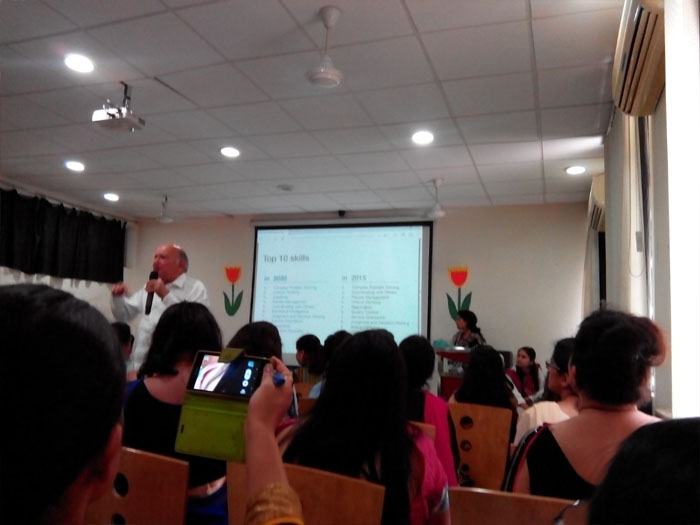Education in the 4th Industrial Age-a teacher workshop
Ramjas School, RK Puram under the aegis of the National Progressive Schools Conference organised a workshop for teachers on Education in the 4th Industrial Age on 20th August, 2016. Approximately 140 teachers of 70 schools around Delhi participated in this workshop which was an endeavour to sensitise teachers about the various aspects of education in the 4th Industrial Age.
The resource person for the day, Dr. M. M. Pant discussed the mega trends of computer technology such as Computational Thinking, Machine Intelligence, Mobile Computing, Robots, Digital Manufacturing of 3D Printing, Big Data, Virtual Reality and Augmented Reality (VR and AR) and their relevance for education today.
Dr. Pant predicted a future with machine intelligence across industries, particularly jobs relating to data storage. According to him, all entry level jobs will be replaced by machines. So, education should cater to these needs. He stressed that the following should be the qualities of future-ready schools:
Provide high quality teaching and learning
Innovative ways of engaging and motivating learners
Ongoing evaluation of each learners progress
Effective use of technology and data
Engaging with parents to support the child
[gallery link="file"]
Dr. Pant also stated, In the changing society, the role of the teacher is to create interest in the student for the learning process and subsequently, make the student more interested in the subject. He believed that the rate of the new is faster than the rate of adapting to the new, which is an issue in the teaching and learning process.
Some of the other factors affecting education in the 4th Industrial Age:
Home schooling vs Regular schooling
Mobile learning tools
Result-oriented society
Dr. Pant held that the pupils mind should be shaped appropriately so that he/she:
understands the purpose of education
defines a problem without guidance
has the ability to ask difficult questions
is motivated to accept failure and learn from the same
manages time well
He reiterated that Blooms taxonomy ie. to create->evaluate->analyse->apply->understand should be applied to the learning process wherever possible.
A child should develop valued skills such as:
1. Complex problem solving
2. Critical thinking
3. Creativity
4. People management
5. Emotion
6. Co-ordination with others
7. Judgement
8. Service orientation
9. Negotiation
10. Flexibility
Dr. Pant concluded the seminar with a statement by Bharat Ratna C.N. Rao: 90% of Indian Universities have outdated curriculum which is a major concern and needs our immediate attention.
Ms. Rachna Pant, principal of Ramjas School also felt that the goal to be achieved should be broken into short term, mid-term and long term goals and choices for the resources should be based upon a time frame. According to her, it is very important for teachers to educate students about the need for filtering data and also validating the same while using the internet.
Ms. Nitu Kumari, Ms. Archana Raichandani.













